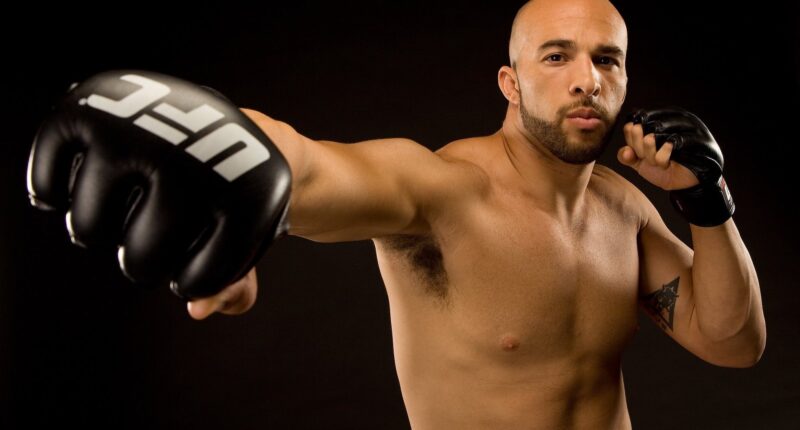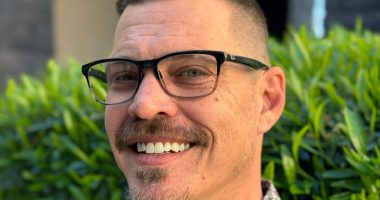It was 2011, and Eliot Marshall had just been fired.
 Jim Kemper | Getty Images
Jim Kemper | Getty Images After about four years of being a UFC fighter — and a lifetime of training — Marshall was given the boot.
“They said I wasn’t good enough,” he says. “Just like most professional sports, you’re either an asset to the company or you’re not, and if you’re not making money [for them], then they get rid of you.”
When you dedicate your life to being a professional athlete, Marshall explains, your identity revolves around the goal of being a champion. When that dream is taken away, your identity “crumbles in front of you,” he says.
And yet, just three days after his last fight, Marshall knew what he was going to do next: “I was going to teach.”
“Did I have any business experience? No. I punched people in the face for a living.”
Almost immediately after retiring from UFC, Marshall started pursuing his lifelong dream of being a martial arts teacher. He reached out to a jiu-jitsu teacher who owned a studio near his home in Denver and purchased the building — which, as he says, was a “favela, a shithole.” It needed a lot of work, but Marshall was dedicated to bringing his dream to life. He fixed up the building and expanded the school — which required significant startup capital.
“The building was $500,000, and then it was another $250,000 to fix,” he says. “If anyone tells you they don’t have doubts, they’re lying. It’s a lot of money. It’s a lot of everything, so you’re like, What the f*** am I doing? This is stupid. But then you wake up the next morning and get to work.”
Marshall’s determination paid off, and the school, Easton Training Center, was such a success that he didn’t want to stop there.
Related: Brandon Marshall: ‘I Approach Business Like I Did My Time in the NFL’
“It worked out, and then we said, ‘All right, let’s do it again.'”

Eliot Marshall at the Denver Easton Training Center | Courtesy of Eliot Marshall
The next Easton Training Center opened in Boulder in 2014, and four years later, the martial arts studio has expanded to nine locations across Colorado.
However, it wasn’t exactly smooth sailing as Marshall built his business. Although the former fighter had been teaching martial arts since he was about 13, when it came to starting a business, he dove in head-first without knowing if his concept would be successful.
“Did I have any business experience? No,” Marshall says. “I punched people in the face for a living, and they punched me back.”
After Marshall opened his first few schools, he began to notice a profound lack of structure. Although the business wasn’t financially crumbling, Marshall could see the ways a lack of core values had created an unsustainable and unproductive environment.
“People would quit. We would argue a lot. We would have these meetings where nothing got done. That was the problem,” he says.
So for the next seven years, Marshall committed to doing more, because he wanted more for the company.
Related: How Establishing Core Values Drives Success
“The richest person in the world and the poorest person in the world, both of their biggest assets are time.”
Marshall knew he needed to create an environment where people weren’t just going to work, they were buying into his vision. He once again went back to the drawing board, but this time he focused on what was intangible. The values Marshall practices and now preaches at his company boil down to one key pillar: respecting everyone’s time.
“The richest person in the world and the poorest person in the world, both of their biggest assets are time,” he says. “So the fact that anybody, any student, any employee, would spend any of that time doing something with me, I have to look at it as my privilege.”
Over the next few years, Marshall began to cultivate a culture where employees and clients felt valued and heard, and the company strengthened because of it.

Eliot Marshall and students at the Denver Easton Training Center | Courtesy of Eliot Marshall
Marshall speaks and acts with intention and strength in a way that is at once commanding and comforting. He embodies the kind of self-confidence so many entrepreneurs strive for as leaders and human beings. When asked if he always had this level of resilience and positivity, he laughs and immediately says no.
Related: Why Vulnerability Is a Strong Business Leader’s Most Powerful Weapon
Although he had built a successful business, he still had feelings of anxiety and fear he’d pushed aside after leaving the UFC. In 2016, Marshall suffered from what he calls a “mental breakdown and spiritual awakening,” wherein he was forced to battle the “demons” that had been buried over the past five years. His business was doing well, but his mental health wasn’t, and he confronted a life-long battle with feeling safe.
“Fighting made me safe,” he says. “If I could be the champion, then I would be safe. Obviously I wasn’t the champion. I was hiding that feeling deep down, and if you’ve got a demon inside of you — mine was safety and the anxiety that I had — it’s going to come say hello at some point.”
For a year Marshall crumbled, battling acute anxiety and insomnia. But he feels that his struggle was necessary to help him grow, and the only way to address his demons was to face them head-on. He sought therapy and support from family and friends, and slowly, Marshall not only began to recover, but he also came out a stronger version of himself.
“My struggle was just hard enough that I could grasp onto something, and what I grasped onto was the idea that I can be more skillful,” he says. “That I am enough in this moment and I can really love myself. And at the same time I can be more skillful tomorrow.”
Related: How to Become the Best Possible Version of Yourself








